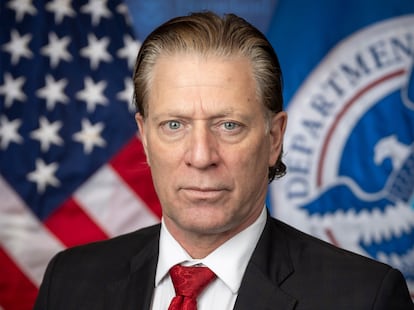David Richardson, keys to understanding the leader of FEMA
A report suggests the administrator was unaware that the US has a hurricane season, although the DHS said it was meant as a joke

On the second day of the 2025 Atlantic hurricane season, the acting administrator of the Federal Emergency Management Agency (FEMA), David Richardson, surprised and confused agency staff by stating that he was unaware that the United States had such a season, according to a Reuters report.
The remark came during an internal meeting and was quickly downplayed by the Department of Homeland Security, which said the official was joking. However, the timing of the comment—just after the National Oceanic and Atmospheric Administration (NOAA) forecast an above-normal season with up to 10 hurricanes—exacerbated concerns about FEMA’s preparedness under Richardson’s leadership. Although he stated that no new disaster response plan would be issued, this contradicted the promise that an updated plan was being prepared.
Richardson’s lack of previous experience in disaster response, his recent contradictory messages, and staff reduction under the second Trump administration have alarmed both current FEMA employees and Democratic lawmakers, including Senate Majority Leader Chuck Schumer and Representative Bennie Thompson, who condemned Richardson’s statements, questioned his credentials for the position, and called for his replacement.
Who is David Richardson?
Raised in Waterford, Michigan, Richardson was an artillery officer in the Marines and led units in Afghanistan, Iraq, and Africa. In 2025, he became deputy secretary of the Department of Homeland Security’s Office of Countering Weapons of Mass Destruction.
Richardson—who has no previous experience in disaster response—took over as acting administrator at FEMA in May, following the sudden dismissal of Cameron Hamilton, who had clashed with Trump after the president expressed his intention to reduce or even dismantle the agency, as he believes that disaster response should fall more heavily on the states.
Trump vs. FEMA
During his first meeting with FEMA, Richardson made a controversial statement to his staff: “Don’t get in my way,” and said that if anyone tried to delay, minimize, or obscure his work, he would “crush” them. “I will achieve the president’s intent” he said. “I, and I alone, speak for FEMA.” Despite not having as public a relationship with the president as other officials in his administration, he revealed himself to be a strong ally of the Republican.
In another meeting, Richardson stated that he would carry out the agency’s actions personally, which included handling disaster payments. He also said he would implement cost sharing with the states.
During his second week, he privately revealed that he had no plan for the Atlantic hurricane season, according to The Wall Street Journal. Later, the cities of Denver, Colorado; Chicago, Illinois; and Pima County in Arizona sued the Trump administration for withdrawing FEMA support.
That same month, the administrator announced that FEMA’s four-year plan, which covered through 2026, would be canceled. “The Strategic Plan contains goals and objectives that bear no connection to FEMA accomplishing its mission. This summer, a new 2026-2030 strategy will be developed. The strategy will tie directly to FEMA executing its Mission Essential Tasks,” he said.
After it was revealed that Richardson allegedly did not know about the hurricane season, The Wall Street Journal reported that the agency will once again adopt last year’s hurricane plan.
Since 2021, nearly a third of FEMA’s full-time staff has left the agency or been laid off, further complicating operations. Richardson secured an extension for more than 2,600 temporary workers essential to disaster response, but he has also reduced the agency’s training and planning activities. It is unclear at this time whether the plan to dismantle FEMA will move forward or when it will happen.
According to NOAA, there were 27 individual weather and climate disasters in 2024 with damages of at least $1 billion. Several studies indicate that hurricanes have become more destructive and costly due to the effects of climate change. Without FEMA support, states will face multimillion-dollar expenses to protect and recover disaster areas.
Sign up for our weekly newsletter to get more English-language news coverage from EL PAÍS USA Edition
Tu suscripción se está usando en otro dispositivo
¿Quieres añadir otro usuario a tu suscripción?
Si continúas leyendo en este dispositivo, no se podrá leer en el otro.
FlechaTu suscripción se está usando en otro dispositivo y solo puedes acceder a EL PAÍS desde un dispositivo a la vez.
Si quieres compartir tu cuenta, cambia tu suscripción a la modalidad Premium, así podrás añadir otro usuario. Cada uno accederá con su propia cuenta de email, lo que os permitirá personalizar vuestra experiencia en EL PAÍS.
¿Tienes una suscripción de empresa? Accede aquí para contratar más cuentas.
En el caso de no saber quién está usando tu cuenta, te recomendamos cambiar tu contraseña aquí.
Si decides continuar compartiendo tu cuenta, este mensaje se mostrará en tu dispositivo y en el de la otra persona que está usando tu cuenta de forma indefinida, afectando a tu experiencia de lectura. Puedes consultar aquí los términos y condiciones de la suscripción digital.









































